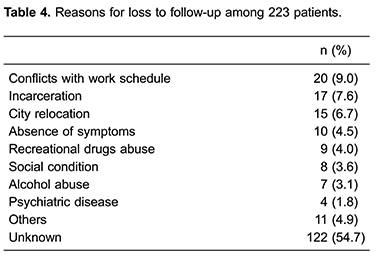Loss to follow-up (LF), which refers to patients who started care but voluntary stopped it, is a problem for patients with chronic disease. We aimed to estimate the rate of LF among patients seropositive for hepatitis C virus (HCV) and identify possible demographic and lifestyle risk factors associated with LF. From January 2009 through December 2012, 1010 anti-HCV-positive patients were included in the study. Among participants, 223 (22.1%) met the case definition for LF (more than 1-year elapsed since the last clinical appointment). Among 787 patients who remained in follow-up, 372 (47.2%) were discharged after undetectable HCV RNA, 88 (11.1%) were transferred (and remained on regular follow-up at the destination), and 25 (3.1%) died. According to univariate analysis, male gender, absence of a life partner, black race, psychiatric illness, previous alcohol abuse, previous or current recreational drug use, and previous or current smoking were significantly associated with LF. In multivariate analysis, absence of a life partner (adjusted odds ratio (AOR)=1.44; 95% confidence interval (95%CI)=1.03–2.02), black race (AOR=1.81, 95%CI=1.12–2.89), psychiatric illness (AOR=1.77, 95%CI=1.14–2.73), and the presence of at least one lifestyle risk factor (pertaining to substance abuse) (AOR=1.95, 95%CI=1.29–2.94) were independently associated with LF. Our study provides an estimate of the incidence of LF among anti-HCV-positive patients and identifies risk factors associated with this outcome. In addition, these results can help clinicians recognize patients at risk for LF, who require additional support for the continuity of care.
Hepatitis C; Follow-up management; Adherence





